Julian Assange no longer needs to be introduced to us. His fight is our fight, the fight for freedom of expression: a freedom that is increasingly threatened these days by the rampant disinformation and the “dictatorship of opinion” that increasingly invades and corrupts our democracies! Whoever controls public opinion controls the world, and the means of manipulating that public opinion are increasingly sophisticated and in the hands of governments, oligarchs and monopoly corporations.
This year, the Academy of Arts in Berlin, an academy founded 300 years ago, dedicated its Konrad-Wolf Prize (in memory of a film director from the former GDR who was president of the Academy for many years) to Julian Assange!
As Julian Assange has been in HMP Belmarsh High Security Prison in London for four years now, fighting his extradition to the USA (where he is threatened with life imprisonment or even the death penalty!), the Academy Prize was received by his wife, Stella Assange, a lawyer who also fights for human rights.
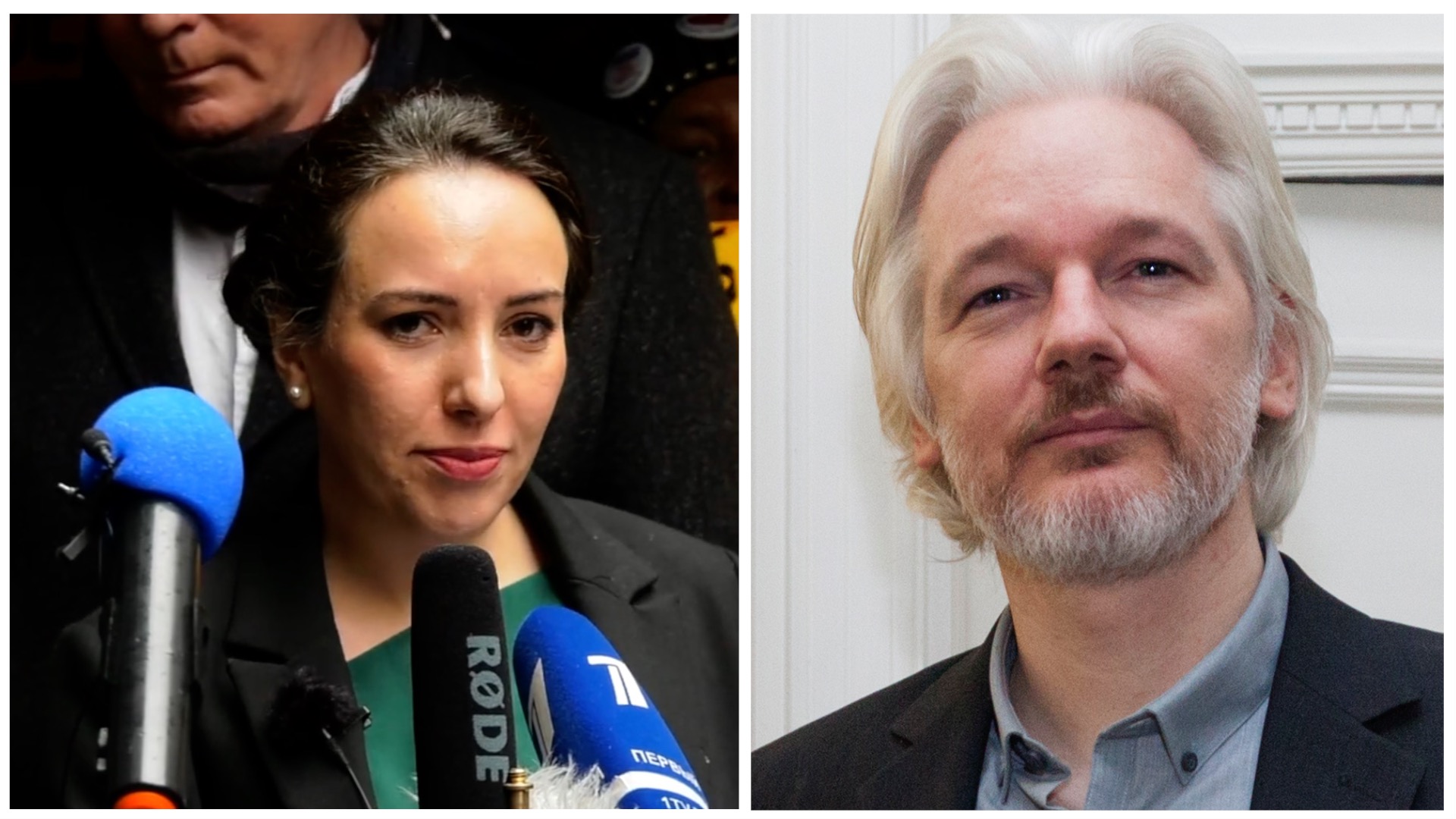 Stella and Julian Assange (Photo by Actvism, Munique)
Stella and Julian Assange (Photo by Actvism, Munique)
Throughout this report, you’ll see several photos taken during the award ceremony…
PRESSENZA also had the opportunity to interview Stella exclusively about Julian’s current situation, which we publish below!
Stella Assange particularly highlighted the positive role of Lula da Silva, who repeatedly talks about Julian Assange at press conferences. Lula also addressed Julian’s case in his opening speech at the UN General Assembly in New York last September, where he demanded his release, to much applause from the overwhelming majority of political representatives from around the world present!
PRESSENZA interview with Stella Assange in Berlin on 22/10/2023
By Vasco Esteves
PRESSENZA:
What is Julian’s current legal situation?
Has the public hearing been held in London to make the final decision on his extradition to the United States?
Has he appealed to the European Court of Human Rights? And could this appeal prevent his extradition?
Stella Assange:
There hasn’t been a public hearing yet, we’re waiting. The date of the public hearing could be the last stage in the UK of Julian’s legal challenge to extradition. If he misses this stage, the legal channels in the UK will be exhausted for him.He must first wait for all domestic appeals to be exhausted before he can appeal to the European Court of Human Rights. The European Court of Human Rights will only accept an appeal when there are no more appeals open in the UK.
Will this appeal delay the extradition or not?
Well, that’s for the European Court to decide. Firstly, whether it accepts the case or not (it’s not automatic) and, if so, it can trigger what’s called the Rule 39 order, which consists of ordering the UK not to extradite while its request is decided. There are therefore several steps to follow. The European Court can order the application of Rule 39, and the UK will have to comply. Obviously, the European Court of Human Rights is the last legal instance within the Council of Europe system. A ruling in Julian’s favor could prevent his extradition, yes.
Have the governments of Portugal or Brazil provided any help or expressed their solidarity with Julian Assange so far?
As far as I know, not the Portuguese government. But Lula da Silva’s Brazilian government has spoken out several times about Julian’s case. Lula da Silva spoke about Julian Assange in his opening speech to the [UN] General Assembly in New York last September. He has also repeatedly spoken about Julian at press conferences.
Now to Germany. Annalena Baerbock, the Green Party’s number one candidate in the last elections, spoke out in favor of Julian’s release BEFORE the elections. Now, after the elections, as Germany’s Foreign Minister, she no longer addresses the issue… Have you spoken to her? And how do you explain her change of position?
I haven’t spoken to Mrs. Baerbock yet. But I have spoken to the German Foreign Office. Merkel’s government [the government before this one] sent observers to discreetly monitor Julian’s case. But I don’t know of the current government having done so. I think the German Foreign Office, also under the previous government, only issued a statement expressing concern about Julian’s humanitarian situation. As far as the Commissioner for Human Rights of the current federal government is concerned, I’m not aware of any kind of formal public position on the matter.
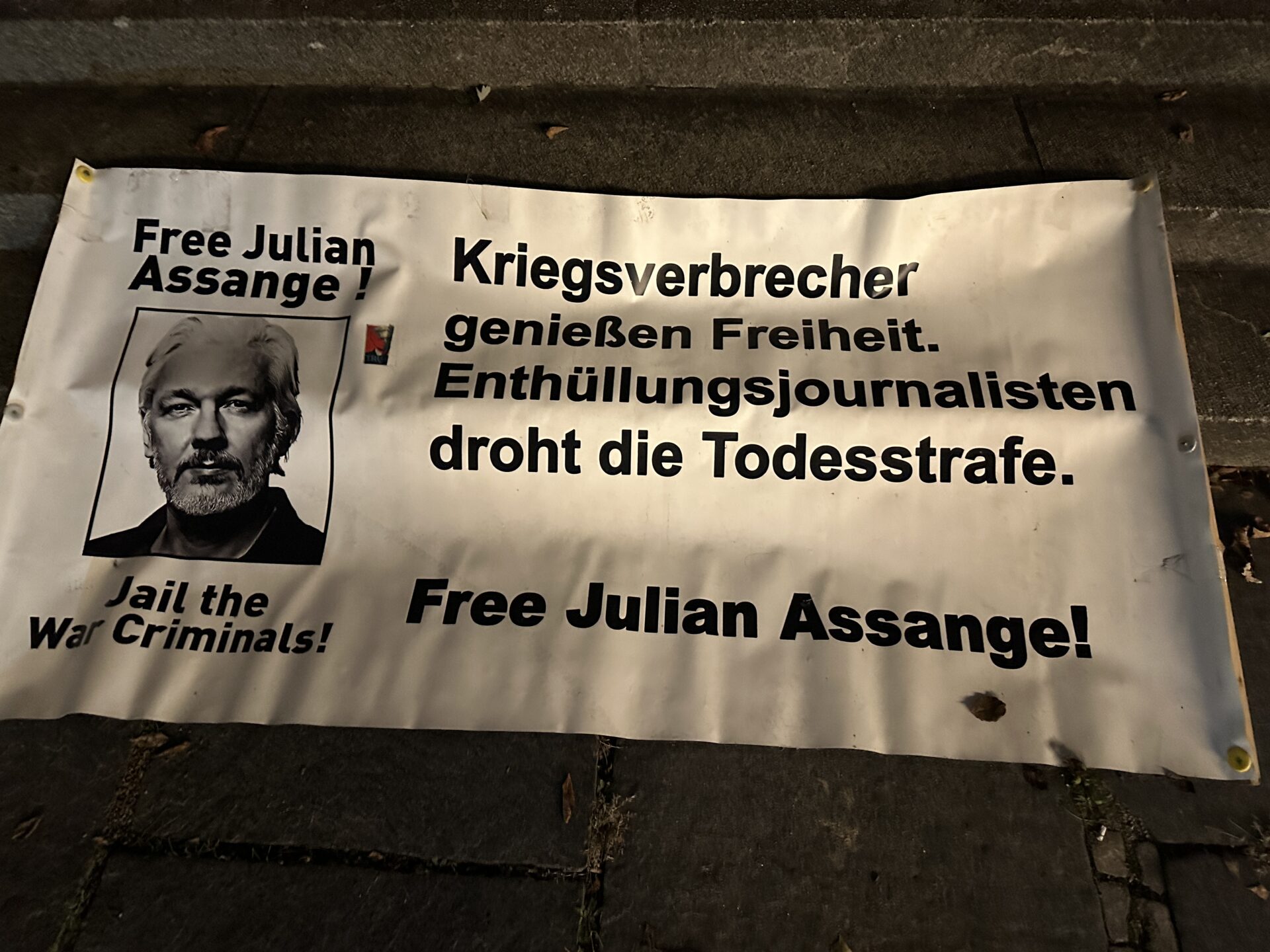 Text of the poster: “Free Julian Assange! War criminals walk free, investigative journalists risk the death penalty. Put war criminals in prison!” (Photo by PRESSENZA)
Text of the poster: “Free Julian Assange! War criminals walk free, investigative journalists risk the death penalty. Put war criminals in prison!” (Photo by PRESSENZA)
Other countries (such as Italy) are doing much more to draw attention to Julian’s situation: for example, by making him an honorary citizen of Naples as well as other cities and now even the capital, Rome. What’s missing here in Germany?
Well, I think Germany is also very supportive of Julian at grassroots level. The German press has also been very positive in its analysis of the case. There was, I think, an ARD [public TV channel] documentary which is very good. SPIEGEL [news magazine] issued a statement saying that the case should be dropped, and they also interviewed me, and so on.
But on an institutional level, Germany is lagging behind other major European countries. Italy, of course, is an excellent example of mobilizing through institutions to obtain political positions.
How do you explain this and what do you think about it?
Well, I don’t know the German situation very well, but what I do see are the results. Maybe the German people are a bit introspective and want to assess the situation first, what mistakes could be made. I think Italy has a more effective democratic system. And I don’t mean that in a way that detracts from that support, which is very strong in Germany, but I don’t see the same kind of translation here as in Italy.
In Berlin, there have been regular actions and vigils for Julian for years. What can people in Berlin do to put even more pressure on Julian’s cause?
The movement to free Julian is a global movement. It’s something that grows over time. Each person has different networks, friendships, family relationships, reach on social media or positions in this or that sector. There are people who go to the square in a small town to hold an individual protest “Free Julian Assange”, draw the size of his cell on the ground with chalk and stay there for an hour or so on a Sunday. For me, it’s a sign of determination and commitment, and it’s inspiring. And when people who aren’t necessarily aware of a case see other people who are very committed, especially when it’s a case of injustice as serious as this, they think, “Well, if this person cares so much about it, then maybe I should too!” That’s very effective. The “Free Assange” movement is not centralized. And then, on any given day, there are protests, mobilizations and so on. So I think we need to organize ourselves to keep going, to reach out to people in positions of power – either through letters or by talking to them directly – and remind them of what they should do if they’re not doing the right thing.
We live in a world where a kind of “dictatorship of opinion” is growing and destroying our democracies from within. McCarthyism and the Cold War are back, even in our minds. Western politicians constantly cry out against the war crimes of others (Russia, Hamas, etc.), but their own war crimes (which Julian Assange decisively helped to uncover!) are ignored or trivialized… and their whistleblowers continue to be ruthlessly persecuted. What do you think and how do you feel in a situation like this?
I think we have to recognize that there is a very significant conflict of interest for many of these large Western countries, which are also the largest arms exporters. In fact, they are suppliers of war! With regard to curtailing freedom of expression, Julian signed a declaration just last week. It’s called the “Westminster Declaration” and it was signed by around 140 people: journalists, activists, but above all people from both the left and the right. People who say that there is now an industry to censor, an industry to control the narrative, and that we need to return to a culture of freedom of expression. I think that without freedom of expression, we cannot hope to promote peace, because the tools to control communication are too strong, so we have to fight for these two things at the same time.
A personal question: What have you learned about yourself from fighting the system?
Well, it’s important not to be afraid and to fight for what you believe in. Fear is our biggest enemy. We have to be able to communicate freely. I’m fighting for my husband. I think many people want to see him free, not only for humanitarian reasons, but also because they understand that his freedom affects them too. I think I’ve learned that each person can play an important role in influencing the world around them and trying to change it for the better. Every little gesture we make shapes the environment around us, even if we don’t realize it immediately. We have an impact. We can all too easily become discouraged, thinking that we can’t change things, that those in power are up there and won’t listen to us… but that’s not the case!
Thank you, Stella, for this interview!


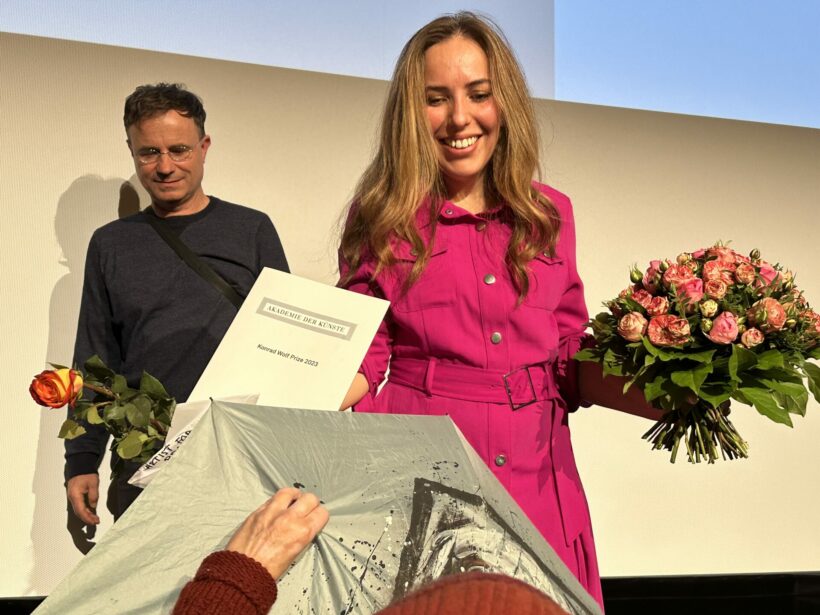
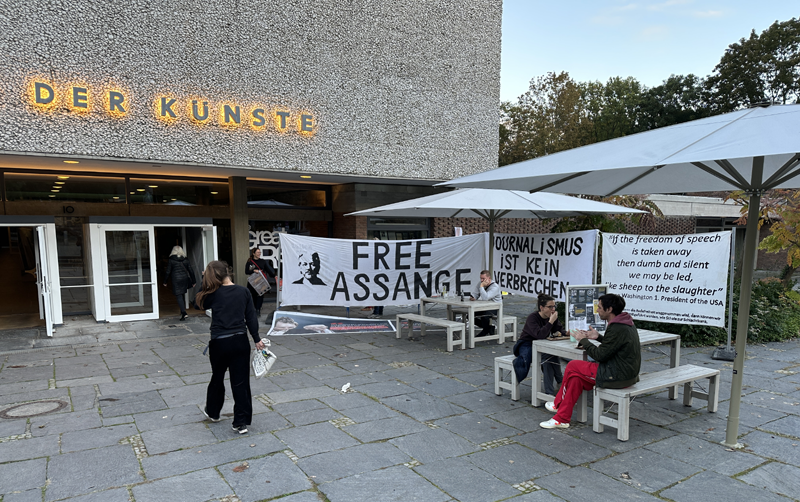 Entrance to the Academy of Arts (Photo by PRESSENZA)
Entrance to the Academy of Arts (Photo by PRESSENZA)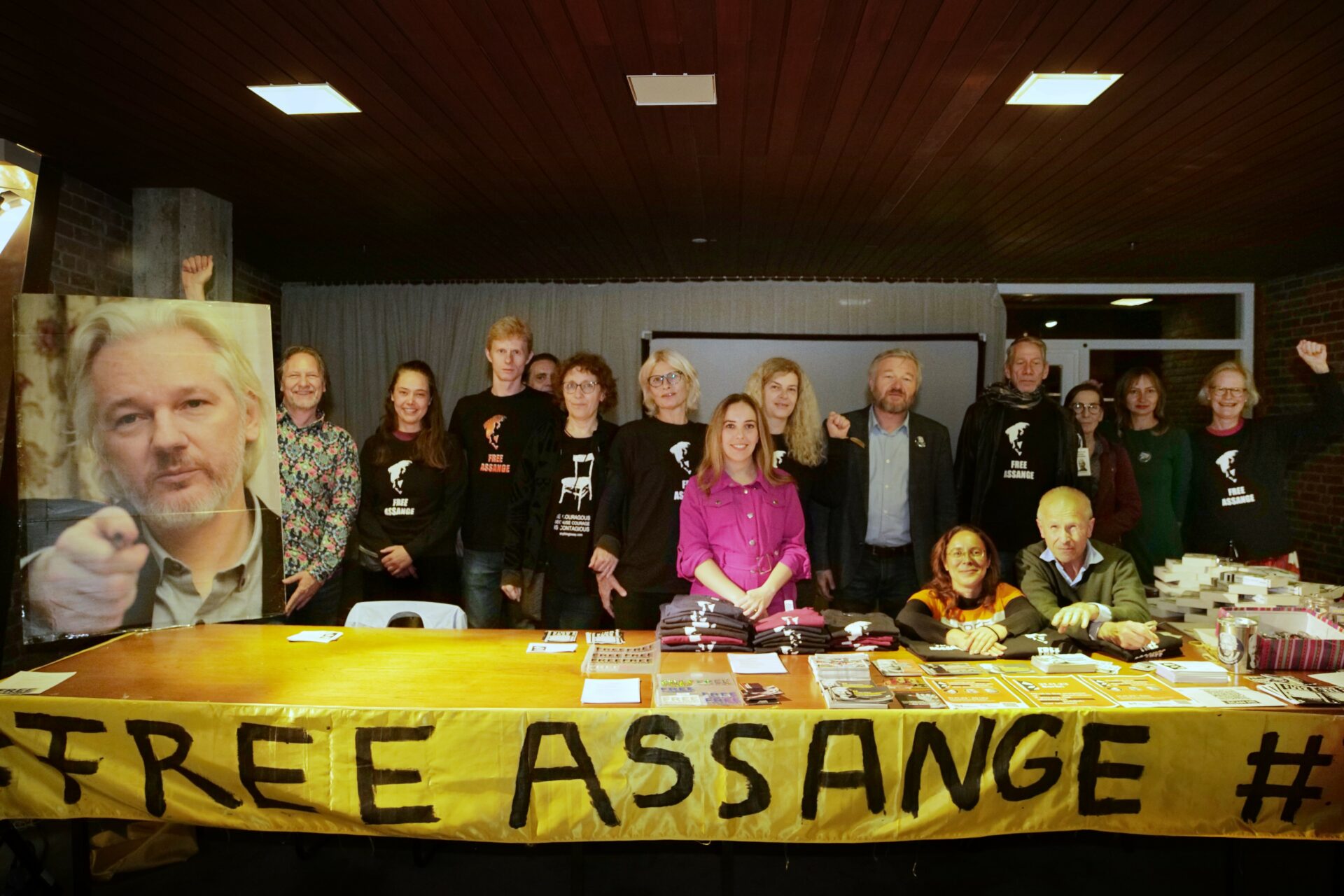 Stella Assange with a group of supporters in Berlin (Photo by Christian Deppe)
Stella Assange with a group of supporters in Berlin (Photo by Christian Deppe)






